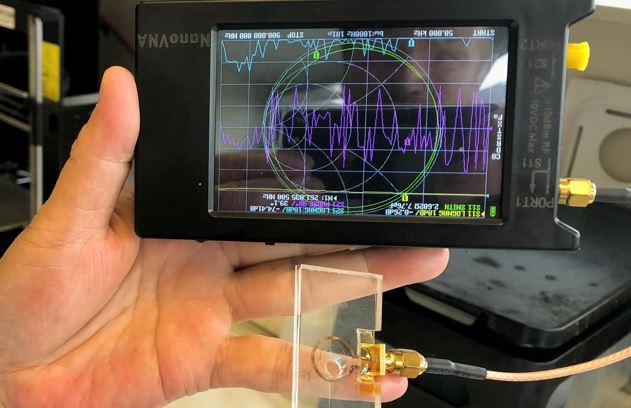Science
University of Waterloo Unveils Rapid Handheld E. coli Detector

A team from the University of Waterloo has developed an innovative handheld device that can detect potentially deadly E. coli in water within a minute. This breakthrough, led by Dr. Carolyn Ren, aims to address the urgent need for rapid testing methods, which currently take hours or even days to yield results.
Dr. Ren, a professor of mechanical and mechatronics engineering and the Canada Research Chair in Microfluidic Technologies at the university, explained the significance of this new technology. Traditional testing methods require collecting a sample, transporting it to a laboratory, and waiting for the results, which can often lead to contaminated water being consumed before safety is confirmed. The device, known as a microwave sensor, is designed to fit in the palm of a hand and costs approximately $70 to manufacture, with testing tips priced at about $1 each.
Addressing Global Health Challenges
The implications of this device extend beyond convenience. The O157 strain of E. coli can be fatal, making rapid detection crucial for public health. According to a statement from the University of Waterloo, this portable technology “could help save lives and reduce illness.” Its potential impact is particularly significant in developing countries, where access to laboratory-based testing is often limited, and populations are more vulnerable to E. coli contamination.
Dr. Ren emphasized that the new device is not only effective for small water samples but can also be scaled up for larger volumes. This adaptability ensures that it meets international E. coli testing standards, further enhancing its potential for widespread use.
The development of this handheld E. coli detector represents a promising advancement in water safety technology, offering a rapid, accessible solution to a persistent global health issue. As communities continue to grapple with water contamination, innovations like these are essential for protecting public health and ensuring safe drinking water for all.
-

 Science1 week ago
Science1 week agoMicrosoft Confirms U.S. Law Overrules Canadian Data Sovereignty
-

 Technology1 week ago
Technology1 week agoGoogle Pixel 10 Pro Fold Specs Unveiled Ahead of Launch
-

 Technology1 week ago
Technology1 week agoWorld of Warcraft Players Buzz Over 19-Quest Bee Challenge
-

 Science5 days ago
Science5 days agoChina’s Wukong Spacesuit Sets New Standard for AI in Space
-

 Health6 days ago
Health6 days agoRideau LRT Station Closed Following Fatal Cardiac Incident
-

 Science1 week ago
Science1 week agoXi Labs Innovates with New AI Operating System Set for 2025 Launch
-

 Lifestyle6 days ago
Lifestyle6 days agoVancouver’s Mini Mini Market Showcases Young Creatives
-

 Science1 week ago
Science1 week agoInfrastructure Overhaul Drives AI Integration at JPMorgan Chase
-

 Technology1 week ago
Technology1 week agoHumanoid Robots Compete in Hilarious Debut Games in Beijing
-

 Top Stories1 week ago
Top Stories1 week agoSurrey Ends Horse Racing at Fraser Downs for Major Redevelopment
-

 Technology1 week ago
Technology1 week agoNew IDR01 Smart Ring Offers Advanced Sports Tracking for $169
-

 Health6 days ago
Health6 days agoB.C. Review Urges Changes in Rare-Disease Drug Funding System
-

 Technology5 days ago
Technology5 days agoDragon Ball: Sparking! Zero Launching on Switch and Switch 2 This November
-

 Science1 week ago
Science1 week agoNew Precision Approach to Treating Depression Tailors Care to Patients
-

 Technology1 week ago
Technology1 week agoGlobal Launch of Ragnarok M: Classic Set for September 3, 2025
-

 Technology1 week ago
Technology1 week agoFuture Entertainment Launches DDoD with Gameplay Trailer Showcase
-

 Business6 days ago
Business6 days agoCanadian Stock Index Rises Slightly Amid Mixed U.S. Markets
-

 Technology1 week ago
Technology1 week agoInnovative 140W GaN Travel Adapter Combines Power and Convenience
-

 Business1 week ago
Business1 week agoNew Estimates Reveal ChatGPT-5 Energy Use Could Soar
-

 Education5 days ago
Education5 days agoParents Demand a Voice in Winnipeg’s Curriculum Changes
-

 Health5 days ago
Health5 days agoRideau LRT Station Closed Following Fatal Cardiac Arrest Incident
-

 Business5 days ago
Business5 days agoAir Canada and Flight Attendants Resume Negotiations Amid Ongoing Strike
-

 Health1 week ago
Health1 week agoGiant Boba and Unique Treats Take Center Stage at Ottawa’s Newest Bubble Tea Shop
-

 Business1 week ago
Business1 week agoSimons Plans Toronto Expansion as Retail Sector Shows Resilience










